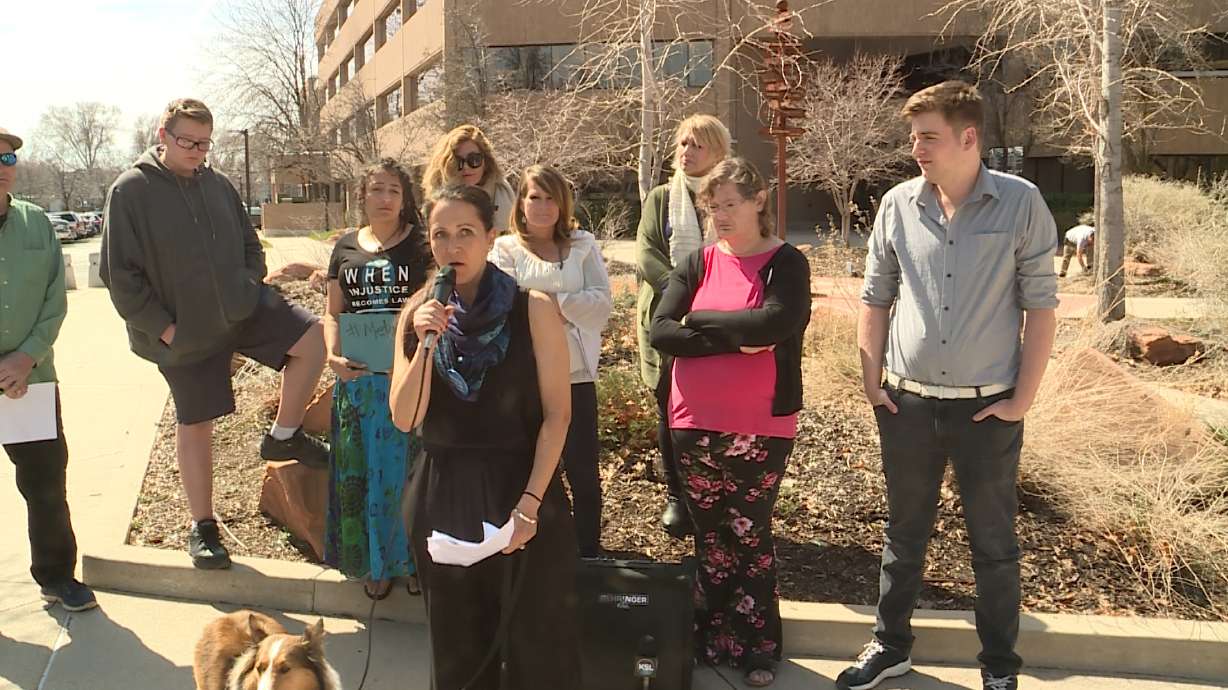Estimated read time: 4-5 minutes
This archived news story is available only for your personal, non-commercial use. Information in the story may be outdated or superseded by additional information. Reading or replaying the story in its archived form does not constitute a republication of the story.
SALT LAKE CITY — Mental health advocates — including nine people and one support dog — gathered Monday to share their experiences interacting with police officers and encourage the use of best practices taught in Crisis Intervention Team training.
"I was a victim of sexual assault. My son got involved. The police did not come as peace officers. Things got out of hand. I actually thought the police were going to shoot my son. They didn’t ask questions, they just started getting violent with him," said Rachel Howard.
Howard lives with post-traumatic stress disorder and a traumatic brain injury. She said collaborating with police, professionals and those with mental illness can save lives.
The group encouraged using the best practice, which they said is the Memphis model and taught to police officers by CIT Utah in a weeklong course.
Ron Bruno is a Utah police officer and CIT Utah program director, he is also the second vice president of CIT International. He said the training will bring officers who understand mental illness to situations where they are needed.
"A person that is emotionally escalated is going to be less predictable, so be prepared for all situations, but slow things down and try to lower the emotional level of that situation," Bruno said.
Ginger Phillips, who organized the group Advocates Gone Rogue and its news conference Monday, said she decided to speak out now because of a spike in officer-involved shootings and lack of funding for police body cameras.
She noted that Salt Lake City Police Department and the Unified Police Department use a separate method when they do training, saying she sees issues with a lack of collaboration, law enforcement officers teaching other officers and the training is completed before officers are certified rather than later in their career.
Salt Lake police detective Michael Ruff said the department trains all its new officers in crisis intervention with a weeklong course in the police academy. He said most of the course is taught by social workers and mental health specialists.
Advocates Gone Rogue Live Video CIT #mentalhealthawareness and #policeandcommunityUT Best practice training for law enforcement to work with individuals in the community who are living with a mental illness.
— GingerSpice (@GingerLPhillips) April 1, 2019
https://t.co/FTF4u8NCBD via @YouTube
"We believe in the training and it's been something that has been implemented throughout our officers," Ruff said.
He said the training gives tools for officers to help people, whether they are working with mentally ill citizens or not.
Bruno — who has 20 years of law enforcement experience and now works as a reserve patrol officer with Unified police and is a vice president of CIT International's board of directors — said the CIT International program continues to do research and spread best practices. He said the program trains experienced officers to deal with mental health at an expert level. It discourages training every officer or new officers.
"We’re looking to develop officers to that level where they have a real clear understanding of mental health issues, they have a real clear understanding of the terminology utilized in the mental health field (and) they have the experience to know their resources," Bruno said.
We’re looking to develop officers to that level where they have a real clear understanding of mental health issues ... of the terminology utilized ... and the experience to know their resources.
–Ron Bruno, CIT Utah
He said officer training is only a part of the purpose of crisis intervention training, which is "building an effective and responsive crisis response system." Bruno said the goal is to build partnerships and cut how often law enforcement is needed.
The advocates also shared positive experiences, showing the difference in response when officers are trained.
Adam Montgomery said he returned from a mission for The Church of Jesus Christ of Latter-day Saints at age 19 after being diagnosed with bipolar disorder. He was involved in treatment and trying to improve his symptoms.
"A few weeks after I started medication treatment my parents came to me and they said they were going to sell my dog. That was a trigger. So I flipped over everything in the house as a protest, a symbolic protest," Montgomery said.
He said the next thing he heard was a knock — it was four police officers. He was surprised at their response. They asked how he was feeling and spoke calmly with him.
"I support any practice that allows these officers to respond in that way. I appreciate those officers helping me in that pivotal time in my recovery," Montgomery said.









